Contents
Show
Book LOLER Thorough Examination
Need your lifting equipment examined in line with LOLER98 regulations? Get a quote today to ensure you remain compliant.

Need your lifting equipment examined in line with LOLER98 regulations? Get a quote today to ensure you remain compliant.
Stay compliant. Stay safe. Book your examination today with SEIS – your trusted independent inspection company in the county of Yorkshire.
Thorough examinations in line with LOLER98 are legally required, periodic examinations, for all lifting equipment. The aim of these examinations is to ensure equipment and workplace safety, and overall compliance in line with UK regulations. In turn protecting your workforce from potential hazards, and you from non compliance.
Book LOLER Inspection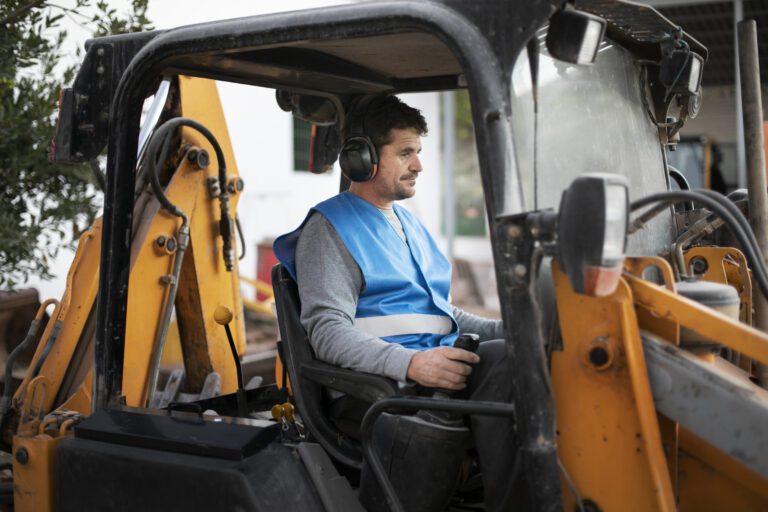
Wakefield is a historic cathedral city in West Yorkshire, England, located on the banks of the River Calder. Known for its rich industrial past, Wakefield played a central role during the Industrial Revolution, particularly in coal mining, textiles, and engineering. It served as a key centre for the Yorkshire coalfield, with numerous collieries in and around the city, and a strong tradition of heavy industry and manufacturing. While these traditional industries have largely declined since the late 20th century, Wakefield has undergone significant regeneration and has successfully diversified its economic base in recent decades.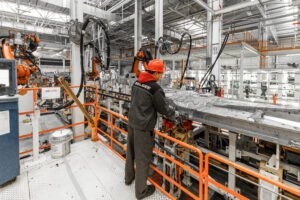
Today, logistics and distribution are among the most prominent industries in Wakefield, due in large part to the city’s strategic location near the M1 and M62 motorways and its excellent rail freight connectivity. This has made it a prime location for national and regional distribution centres. Major retailers and logistics companies such as ASDA, Next, Royal Mail, and XPO Logistics operate large facilities in the area. These centres support thousands of jobs and play a vital role in the movement of goods across the UK.
Manufacturing also continues to be an important part of Wakefield’s economy, though it has shifted from traditional heavy industry to light manufacturing and advanced engineering. The city and its surrounding areas are home to companies involved in food production, chemicals, electronics, packaging, and fabricated metal products. Wakefield’s manufacturing sector supports a variety of supply chains, including those in construction, automotive, and consumer goods. Industrial estates such as Wakefield Europort, Calder Park, and Langthwaite Business Park house many of these enterprises.
The creative and digital industries are emerging as a growth sector in Wakefield. Supported by local investment and proximity to the larger Leeds City Region, the city is nurturing a community of designers, software developers, media producers, and marketing agencies. Cultural institutions like The Hepworth Wakefield, a major modern art gallery named after sculptor Barbara Hepworth, are helping to reposition the city as a centre for art, culture, and creativity.
Retail, education, and healthcare are key parts of the service economy in Wakefield. The city has several retail parks and a bustling town centre, while Wakefield College and local schools provide education and vocational training that support the local workforce. Pinderfields Hospital, part of the Mid Yorkshire Hospitals NHS Trust, is one of the largest employers in the area and a major healthcare provider for the region.
Wakefield has successfully transitioned from a coal mining and textile hub into a modern, service-oriented economy with growing strengths in logistics, light manufacturing, creative industries, and healthcare. Its strong transport links, skilled workforce, and ongoing investment in regeneration projects make it an important economic player in West Yorkshire and a city that continues to evolve with the demands of the 21st century.
Wakefield is a city in West Yorkshire, situated on the River Calder and surrounded by towns and villages such as Ossett, Horbury, Normanton, Castleford, Knottingley, and Stanley. These settlements developed along river valleys and major transport routes, including canals, railways, and later motorways, which supported industrial growth and trade. Wakefield has long acted as an administrative, commercial, and industrial centre for the surrounding area.
Historically, the economy of Wakefield and its neighbouring towns and villages was shaped by coal mining, textiles, and engineering. Collieries in areas such as Normanton, Castleford, and Stanley provided employment for generations, while woollen textile mills were common in places like Ossett and Horbury. Agriculture remained important in the surrounding rural areas, supplying food and raw materials to the growing towns.
Following the decline of heavy industry in the late 20th century, the area diversified economically. Logistics, warehousing, and distribution have become major employers, benefiting from Wakefield’s central location and strong road and rail links. Light manufacturing, retail, healthcare, education, and public services also play a significant role in employment across Wakefield and its surrounding communities.
Today, the towns and villages around Wakefield reflect a blend of industrial heritage and modern economic activity. While coal mining and textiles shaped much of the area’s history, the local economy now supports a wide mix of industries, services, and commuter-based employment, with Wakefield continuing to serve as a key hub within West Yorkshire.
For these businesses and industries, staying compliant with the Lifting Operations and Lifting Equipment Regulations 1998 (LOLER) is not just a legal requirement—it’s also about safeguarding your employees, protecting your business reputation, and ensuring your equipment remains safe and reliable.
LOLER regulations place strict duties on business owners and equipment operators. Any business in Wakefield that owns or operates lifting equipment must ensure that:
Lifting equipment is safe to use.
Examinations are carried out at regular, legally required intervals.
Inspections are conducted by a competent and impartial person.
Failure to comply can lead to heavy fines, prosecution, and serious safety risks.
At SEIS, we know that every business in Wakefield – whether in heavy industry, healthcare, education, or automotive—depends on reliable, safe equipment. Regular LOLER inspections reduce the risk of accidents, protect your workforce, and ensure smooth day-to-day operations. Compliance not only keeps you legal, but also demonstrates a strong commitment to employee safety.
Book LOLER InspectionA thorough examination under LOLER is a detailed and legally required inspection of lifting equipment. Unlike simple checks or maintenance tasks, a LOLER examination must be performed by an impartial, competent person and results in an official Report of Thorough Examination.
How often your lifting equipment in Wakefield needs to be inspected & tested depends on its type and use:
Every 6 months – For lifting equipment used to lift persons (e.g., passenger lifts, wheelchair lifts, patient hoists), or lifting accessories and attachments.
Every 12 months – For other lifting equipment (e.g., cranes, forklifts, goods lifts).
After significant changes or repairs – Equipment must be inspected immediately if it has been modified, damaged, or relocated.
LOLER requires inspections to be carried out by a competent and independent person—not by the equipment supplier or operator. At SEIS, we meet these exact criteria. Our inspections are impartial, unbiased, and always in line with UK regulations.
Book LOLER InspectionBusinesses in Wakefield use a vast range of lifting equipment, and at SEIS we provide LOLER inspections across them all.
Passenger lifts
Goods lifts
Vehicle lifts
Wheelchair and platform lifts
Overhead travelling cranes
Mobile cranes
Forklift trucks
Lifting tackle and accessories
Slings (chains, ropes, webbing)
Shackles and hooks
Lifting beams and frames
Chain blocks and lever hoists
No matter the type of equipment on your site, SEIS ensures every examination is completed thoroughly, with full reports for your compliance records.
Book LOLER Inspection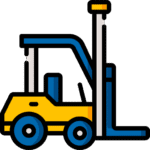
A thorough examination on a fork lift truck or reach truck ensures all safety critical components are identified in line with SAFed guidance MLCC 07, and the plant is examined in line with SAFed guidance LG 4. This includes a full structural integrity assessment, referencing specific guidances such as BS ISO 5057:2022 for fork arm inspections, and testing of any safety systems present.
Fork Lift - Learn More Reach Truck - Learn More
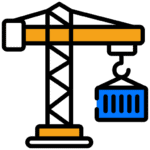
A thorough examination on a crane (all variants) ensures all safety critical components are identified in line with SAFed guidance MLCC 07, and the plant is thoroughly examined. This includes a full structural integrity assessment, referencing specific guidances such as BS ISO 4309:2017 for rejection criteria of the steel wire hoisting rope, and testing of any safety systems present.
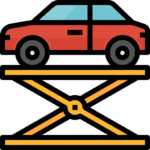
A thorough examination on a motor vehicle lifting table (all variants) ensures all safety critical components are identified in line with SAFed guidance MLCC 07, and consideration is given to SAFed guidance MLCC 13 whilst the plant is thoroughly examined. This includes a full structural integrity assessment, referencing specific guidances such as BS ISO 4309:2017 for rejection criteria of the steel wire hoisting rope, any manufacturers guidance for inspection of load nuts and safety nuts, and testing of any safety systems present
Vehicle Lift - Learn More Vehicle Jack - Learn More

A thorough examination on chain hoists, lifting tackle and lifting attachments (all variants) ensures all safety critical components are identified in line with SAFed guidance MLCC 07, and the plant is thoroughly examined. This includes a full structural integrity assessment, referencing specific guidances such as BS ISO 4309:2017 for rejection criteria of the steel wire hoisting rope, PM28 for non-integrated work platforms, and testing of any safety systems present.
Lifting Tackle- Learn More Lifting Attachment - Learn More
Chain Hoist - Learn More

A thorough examination on Passnger/Goods lift (all variants) ensures all safety critical components are identified in line with SAFed guidance MLCC 07, and consideration to SAFed guidance LG 01 is applied whilst the plant is thoroughly examined. This includes a full structural integrity assessment, referencing specific guidances such as SAFed LG01 for rejection criteria of the suspension ropes, any further manufacturers specific guidance for inspection and rejection criteria of suspension ropes, and testing of any safety systems present.

A thorough examination on Platform lifts (all variants) ensures all safety critical components are identified in line with SAFed guidance MLCC 07, and consideration to SAFed guidance LG 01 is applied whilst the plant is thoroughly examined. This includes a full structural integrity assessment, referencing specific guidances such as SAFed LG01 for rejection criteria of the suspension ropes, any further manufacturers specific guidance for inspection and rejection criteria of suspension ropes, manufacturers criteria on load nut rejection, and testing of any safety systems present.

A thorough examination on a vacuum lifting machine (all variants) ensures all safety critical components are identified in line with SAFed guidance MLCC 07. This includes a full structural integrity assessment, referencing specific manufacturers guidances, and testing of any safety systems present.

A thorough examination on a Mobile Elevating Work Platform (MEWP) ensures all safety critical components are identified in line with SAFed guidance MLCC 07. This includes a full structural integrity assessment, referencing specific manufacturers guidances, and testing of any safety systems present.
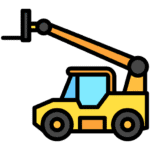
A thorough examination on a fork lift truck ensures all safety critical components are identified in line with SAFed guidance MLCC 07. This includes a full structural integrity assessment, referencing specific guidances such as BS ISO 5057:2022 for fork arm inspections, and testing of any safety systems present.
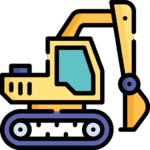
A thorough examination on a fork lift truck ensures all safety critical components are identified in line with SAFed guidance MLCC 07. This includes a full structural integrity assessment, referencing specific manufacturers guidances, and testing of any safety systems present.
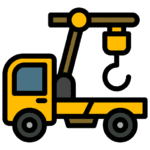
A thorough examination on a lorry mounted crane/ HIAB (all variants) ensures all safety critical components are identified in line with SAFed guidance MLCC 07, and consideration is given to BS 7121-2-4:2013 whilst the plant is thoroughly examined. This includes a full structural integrity assessment, referencing specific guidances such as BS ISO 4309:2017 for rejection criteria of the steel wire hoisting rope, and testing of any safety systems present (RCI & RCC).

A thorough examination on a personnel hoist, stair lift/ wheel chair stair lift and personnel sling (all variants) ensures all safety critical components are identified in line with SAFed guidance MLCC 07, and the plant is thoroughly examined.This includes a full structural integrity assessment, referencing specific manufacturers guidances, and testing of any safety systems present.
Patient Hoist - Learn More Stair Lift- Learn More

A thorough examination on a fork lift truck or reach truck ensures all safety critical components are identified in line with SAFed guidance MLCC 07, and the plant is examined in line with SAFed guidance LG 4. This includes a full structural integrity assessment, referencing specific guidances such as BS ISO 5057:2022 for fork arm inspections, and testing of any safety systems present.

A thorough examination on a fork lift truck or reach truck ensures all safety critical components are identified in line with SAFed guidance MLCC 07. This includes a full structural integrity assessment, referencing specific manufacturers guidances regarding load testing, referencing of MLCC01 for load chain elongation (if fitted) and testing of any safety systems present.

SEIS is proud to support Wakefield businesses with impartial, expert inspections. We understand the local industries, from the port to food production, and we tailor our service to meet your needs.
As an independent inspection provider, we do not sell or repair lifting equipment. This means you can trust our assessments to be impartial, unbiased, and fully in line with LOLER regulations.
Our team of qualified surveyors have years of hands-on experience across multiple industries. They know exactly what to look for and how to ensure your business remains compliant without unnecessary disruption.
We understand that downtime costs money. That’s why we work around your production schedule, conducting inspections efficiently and professionally so your operations continue smoothly.
Book LOLER InspectionWe make LOLER inspections & testing straightforward and hassle-free for local businesses.
Simply get in touch with our team, and we’ll arrange a time that works for you.
Our engineer surveyors visit your site and carry out thorough examinations with minimal disruption.
After each inspection, you’ll receive a clear, detailed report highlighting any defects and recommended actions.
We’ll manage your inspection schedule, reminding you before your next due date. Plus, you’ll have access to our online reporting portal, so your certificates are always at your fingertips.
Book LOLER InspectionChoosing the right inspection provider makes all the difference. Here’s why Wakefield businesses trust SEIS:
From the heavy industry and food manufacturing to hospitals, schools, and garages, we understand the unique challenges businesses here face.
We provide inspections for:
Heavy industry
Education
Healthcare
Automotive
We pride ourselves on safety, compliance, and customer service—always putting your needs first.
Wakefield is a city in West Yorkshire, England, located on the River Calder.
It has historically been an important centre for coal mining and textiles.
Wakefield was part of the historic West Riding of Yorkshire.
The city became a city by letters patent in 1888.
Wakefield is known for Wakefield Cathedral, which has the tallest spire in Yorkshire.
The surrounding area includes towns such as Ossett, Horbury, Normanton, and Castleford.
Wakefield’s location gives it strong transport links via rail and nearby motorways including the M1.
The city played a role in the English Civil War, including the Battle of Wakefield in 1460.
Wakefield has a strong cultural scene, including The Hepworth Wakefield art gallery.
Today, the local economy includes logistics, retail, education, healthcare, and light manufacturing.
Booking with SEIS is quick and easy:
✅ Call our friendly team
✅ Fill in our online booking form
✅ Get your inspection arranged around your schedule
We’ll handle the rest, ensuring your equipment is inspected thoroughly, your compliance is up to date, and your workforce is kept safe.
A LOLER inspection, or thorough examination, is a legally required check of lifting equipment to ensure it is safe, compliant, and fit for use.
Inspections are required:
Only a competent and impartial person can perform LOLER inspections. At SEIS, our independent surveyors meet these requirements.
LOLER applies to:
and all lifting accessories used at work.
Yes. Whether you run a large factory or a small garage, any business operating lifting equipment must comply with LOLER.
Non-compliance can lead to fines, legal penalties, equipment downtime, and serious safety risks for staff.
No. SEIS works around your schedule to complete inspections efficiently, minimising downtime and disruption.
You’ll get a digital Report of Thorough Examination by email and access via our secure online portal.
Yes. We manage your compliance schedule and send reminders before your equipment is due for inspection.
Yes. Alongside Wakefield we also cover the whole Yorkshire region. SEIS also serve neighbouring areas, such Lincolnshire and the Midlands. We also serve clients nationwide!